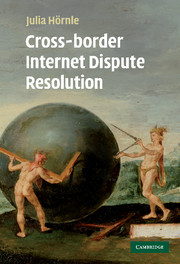Book contents
- Frontmatter
- Contents
- List of illustrations
- List of tables
- Table of cases
- Table of UK statutes
- Table of UK statutory instruments
- Table of European Communities legislation and documents
- Table of foreign statutes
- Table of treaties and conventions
- Acknowledgements
- List of abbreviations
- 1 Introduction
- 2 The concepts of fairness
- 3 Internet disputes
- 4 ADR and applicable law
- 5 ODR and access
- 6 Arbitration and due process
- 7 Internet disputes and fair arbitration
- 8 A model of dispute resolution for the Internet
- Bibliography
- Index
- References
6 - Arbitration and due process
Published online by Cambridge University Press: 30 November 2009
- Frontmatter
- Contents
- List of illustrations
- List of tables
- Table of cases
- Table of UK statutes
- Table of UK statutory instruments
- Table of European Communities legislation and documents
- Table of foreign statutes
- Table of treaties and conventions
- Acknowledgements
- List of abbreviations
- 1 Introduction
- 2 The concepts of fairness
- 3 Internet disputes
- 4 ADR and applicable law
- 5 ODR and access
- 6 Arbitration and due process
- 7 Internet disputes and fair arbitration
- 8 A model of dispute resolution for the Internet
- Bibliography
- Index
- References
Summary
Convenience and justice are often not on speaking terms.
(Lord Atkin in General Medical Council v. Spackman [1943] AC 627 (HL), 638)Introduction
This book develops a model for the fair resolution of Internet disputes. Since online arbitration has been suggested as the most important method to solve Internet disputes for the model, the fundamental question is whether the use of online arbitration based on the structures and principles of commercial arbitration is fair for these types of disputes and, to the extent that the answer to this question is ‘no’, how arbitration should be adapted for the purposes of this model.
This chapter concentrates on due process, which has been defined as a constituent element of fairness (alongside access and the counterpoise) in Chapter 2. By way of reminder, Chapter 2 posits two elements of due process (equal treatment of the parties before an adjudicator and rationality, in the sense that the adjudicator must not take into account any irrelevant or irrational considerations).
This chapter applies these due process principles to arbitration. It starts by exploring the sources of law for due process in arbitration, and examines the elements of due process, contrasting litigation and arbitration. This chapter discusses the principles of impartiality and independence, fair hearing, the duty to give reasons, transparency and rights to an appeal or judicial review.
Sources of legal due process
Before the discussion can proceed, it is necessary to explain the sources of law for the due process requirements.
Information
- Type
- Chapter
- Information
- Cross-border Internet Dispute Resolution , pp. 91 - 168Publisher: Cambridge University PressPrint publication year: 2009
